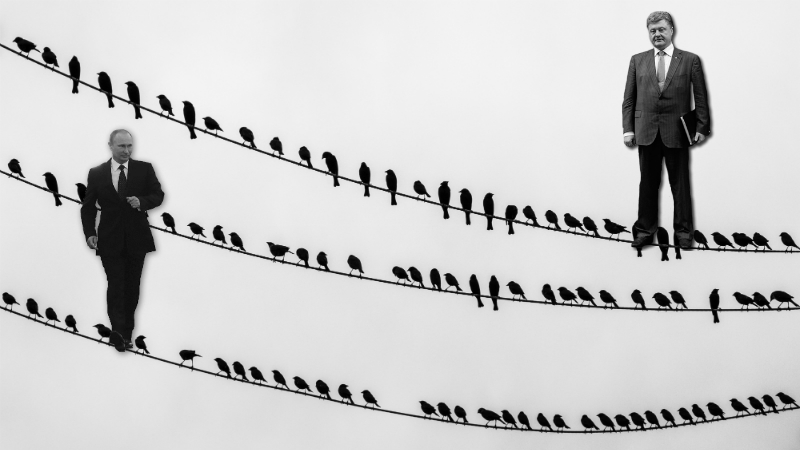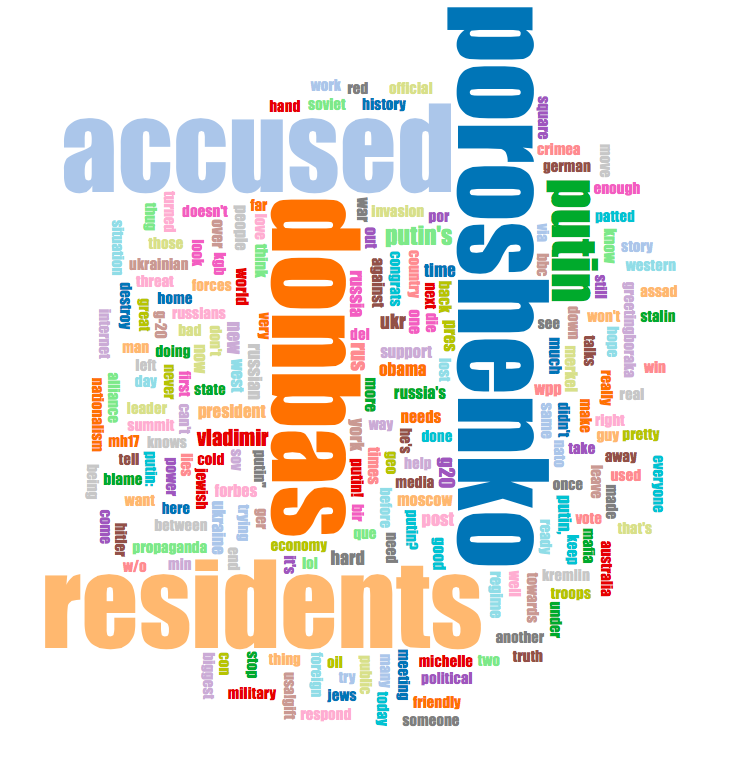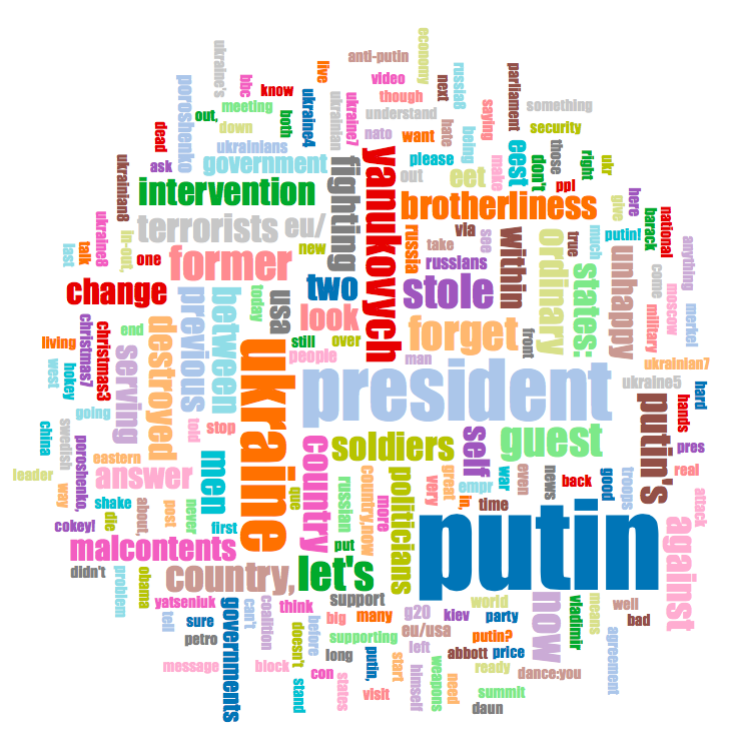
What do Russians and Ukrainians talk about when they tweet about their presidents? Images mixed by Tetyana Lokot.
This article is part of a citizen-media data-analysis project, a collaboration between RuNet Echo and the Maryland Institute for Technology in the Humanities. Explore the complete article series on the All the Presidents’ Tweets page.
In our previous posts, we've looked at the language distribution and the geospatial variety of the tweets in our six-million-strong data set. But one of the goals of our analysis was to delve deeper into the content from Twitter users in Ukraine and Russia in order to see how they were talking about the presidents of their countries. Thus, we filtered the tweets by “country code”—one of the many characteristics Twitter provides for each user as part of its metadata. While not every user chooses to specify their country on Twitter, the “country code” designation is still a reliable and transparent way to narrow down our huge pool of tweets to those that represent a meaningful sample of users based in our countries of interest.
After parsing the larger tweet archive, collected in October and November 2014, we ended up with a little over 6,000 tweets with country code “UA” (Ukraine) and almost 8,500 tweets with country code “RU” (Russia). As in our larger sample, all tweets in the two smaller country samples contain one or more of the following keywords: poroshenko, putin, порошенко, путин and путін.
This is a much smaller amount of data than six million tweets, but it is more meaningful, since it represents a sample of Twitter users united by language, geography, citizenship and many other things. At the same time, comparing Ukrainian and Russian users tweeting about Putin and Poroshenko can yield some insights into how the conversation around the key political figures differs by country.
To give our readers an overview of the Ukrainian and Russian discourse about the heads of states on Twitter, we decided to use word clouds. A word cloud (also known as a subtype of a weighed list in visual design) is a simple, but effective graphic format that allows to visualize a text or, in this case, a collection of tweets containing text, as a cloud-like shape made of words, in which the size of each word indicates its frequency or importance. In our case, the size of each keyword reflects the frequency of the words in the tweets from each subset.
We used a tool called Twarc Wordcloud (made by Ed Summers, open source) to generate word clouds for the Ukrainian and Russian Twitter samples. Since our word cloud script doesn't read Cyrillic, we mostly ended up with content from English-language tweets (apart from cases where Latin characters were used, e.g. for hashtags). Despite the limitations, the results were quite interesting.
Russian Twitter Discourse

Top terms in tweets with country code for Russia from larger sample containing keywords poroshenko, putin, порошенко, путин and путін.
Perhaps surprisingly, Ukrainian president Poroshenko features more heavily in tweets by Russian users during the fall of 2014 than his counterpart, Putin. While the latter is still prominent, the former is mentioned much more, along with “Donbas” (curiously, the top term is the Ukrainian spelling of the region embroiled in conflict; the Russian is “Donbass”), and “residents” (presumably of eastern Ukraine). Also used quite often is the verb “accused,” although it would require closer analysis of tweets to see who exactly was accusing whom, and of what—but certainly, plenty of accusations were flung both ways during the fall of 2014.
Other words that featured often in the Russian sample include the names of some world leaders, like Obama and Assad, and historical figures, like Hitler and Stalin. Another set of terms features key events of the Ukrainian crisis, such as the MH17 tragedy, Crimea, and the G-20 summit. Words like “war,” “threat,” and “propaganda” are also prominent, indicating that Russian Twitter users seemingly talk quite often about both presidents in the context of the conflict and its political circumstances.
Ukrainian Twitter Discourse

Top terms in tweets with country code for Ukraine from larger sample containing keywords poroshenko, putin, порошенко, путин and путін.
Interestingly, Putin features more prominently in the Ukrainian Twitter sample discourse—a mirror opposite to the Russian discourse favoring Poroshenko. Another surprise is how seldom Poroshenko himself is mentioned: instead, tweets from Ukrainians contain more mentions of Ukraine's previous president, Viktor Yanukovych, who was ousted in the wake of the Euromaidan protests in February 2014. “Ukraine” itself features quite prominently as a keyword, along with conflict-related terms like “terrorists,” “intervention,” “destroyed,” “soldiers,” and “fighting.” These indicate that the context for discussions of top political brass by Ukrainians is similar to that of Russians in our sample. The word “change” is also used fairly often, suggesting perhaps, some positive sentiments in the post-Euromaidan political discourse.
In our next posts, we'll delve deeper into more comparative analysis of the tweets’ content. We'll also examine the network of users behind the tweets to better understand who is tweeting about the Russian and Ukrainian presidents.








2 comments
Watch SotnikTV on Youtube. The true reality.